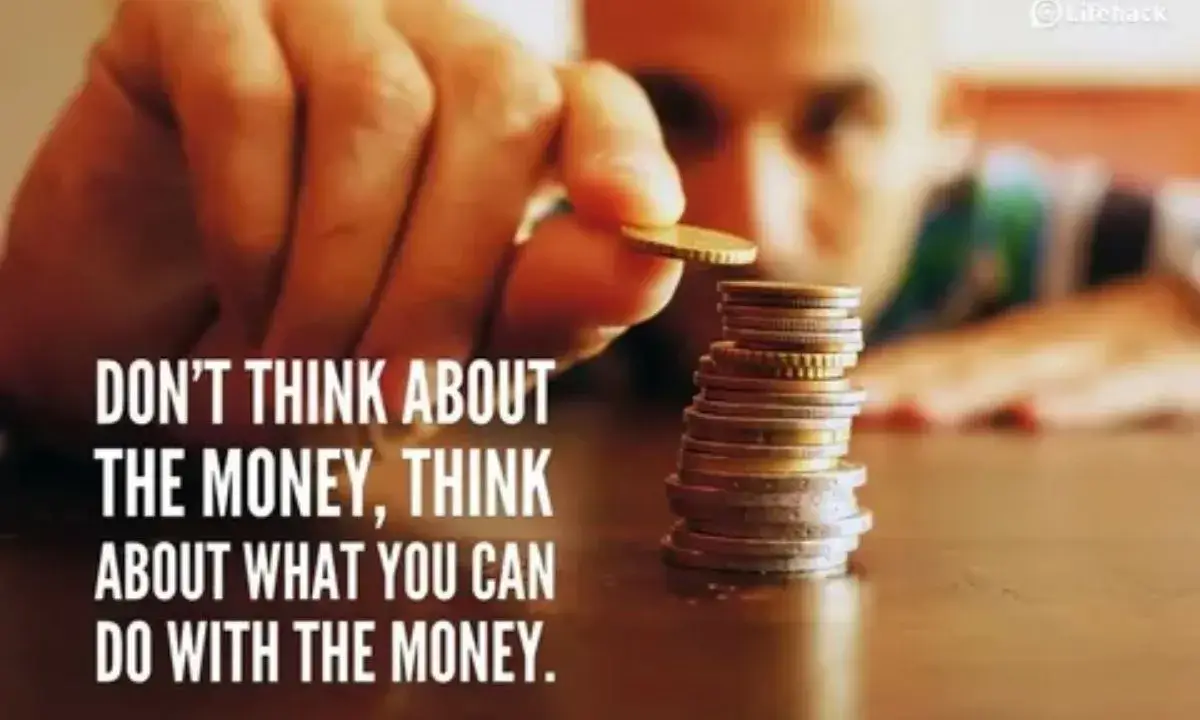Introduction — Why Your Money Mindset Matters More Than Your Income
Have you ever noticed two people earning roughly the same amount, yet one seems free, making bold life choices, while the other feels trapped? The difference usually isn’t the salary—it’s the mindset. The concept of “Money BetterThisWorld” revolves around shifting how you think about money from mere earning and spending — to purposeful transformation. Financial freedom isn’t just about increasing income; it’s about rewiring how you see, use, and leverage money to build time, values, and impact. Research in behavioural finance and psychology supports this: your beliefs about money often dictate your financial behaviour more than your paycheck. (creighton.edu)
In this article, you’ll learn how to:
- Rethink what money really means
- Adopt the Money BetterThisWorld philosophy
- Identify and shift limiting money beliefs
- Apply smart money thinking in daily life
- Navigate the emotional side of money
- See how your money mindset creates ripple effects in society
We’ll go deep, but I promise you’ll find plenty of practical take-aways you can apply today.
Rethinking What Money Really Means
What Most People Get Wrong About Money
Most of us learn early that “money = spending power”. But that’s only part of the story. When we treat money purely as a transaction tool—buy this, pay that—we miss its potential as a leverage vehicle for life design. For example: having $10,000 in the bank feels great. But what if that money gives you three months of runway, the optional ability to say “no” to a job”, or the chance to pursue a side project that could change your path? Then it becomes far more than a number.
From Transaction to Transformation
Behavioural research shows that mindset matters. For example, one study found that people who view money as a tool for choice and impact behave differently than those who just view money as a reward. The shift from “earning to spend” to “earning to build optionality” changes decisions, risk tolerance, savings habits and the way one invests. (Georgetown University)
When you frame money as “the ability to do what matters” rather than “the ability to buy what’s next,” your actions change: you save more, you invest differently, you align with your values.
The “Money BetterThisWorld” Framework
Definition and Core Philosophy
Money BetterThisWorld is a mindset that treats money as a life-shaping instrument, not just a ledger entry. At its core:
- Smart money thinking — making financial decisions on purpose, not by default.
- Purpose-driven finance — aligning your money with your values, not just your wants.
- Transformation over transaction — using money to build freedom, resilience, and impact.
- Conscious economy — seeing money as part of a broader system (community, environment, legacy) rather than isolated personal gains.
This philosophy invites you to ask: What does money enable me to become? rather than just What can money buy me?
The Psychology Behind Smart Money Thinking
Several psychological models underpin this framework:
- Money scripts: Deeply ingrained beliefs about money (from childhood, culture, trauma) that shape your behaviour. (creighton.edu)
- Scarcity vs. sufficiency mindset: The belief of “never enough” often leads to hoarding or over-cautious behaviour; an abundance/sufficiency mindset fosters growth, calculated risk and value alignment. (relationalpsych.group)
- Behavioural finance and prospect theory: Financial decisions aren’t purely rational – loss aversion, risk perception, and cognitive biases matter. (Wikipedia)
Together these models show us that to think smart, we must address both the rational and emotional side of money.
Redefining Wealth: Beyond Numbers and Net Worth
Traditional view: “Wealth = lots of money + assets.”
Money BetterThisWorld view: Wealth = time, optionality, freedom, purpose, social connection.
Here’s a comparison:
| Traditional Metric | Money BetterThisWorld Metric |
|---|---|
| Net worth/Assets | Time freedom (how much life you control) |
| Income level | Optionality (what you can say yes or no to) |
| Material accumulation | Values-alignment (does your spending/investing reflect your values?) |
| Status goods | Social & emotional wealth (relationships, legacy, contribution) |
Research backs this shift: subjective well-being correlates more with perceived control and purpose than raw income beyond a point. (northstarfinancial.com)
So your money isn’t just about numbers—it’s about what those numbers enable.
Building a Healthier Relationship With Money
Identifying Hidden Limiting Beliefs
Often the biggest barriers are invisible. You might hear yourself saying: “I’m just not good with money,” or “I’ll never get ahead.” These phrases reflect underlying money scripts. In one study of 422 people, researchers found four distinct belief-patterns tied to income and net worth. (New Prairie Press)
Common limiting beliefs include:
- “There’s never enough money.”
- “Money is the root of all evil.”
- “If I make more money, I’ll have more problems.”
- “I don’t deserve to be wealthy.”
Take a moment: reflect on your earliest memories around money. What did you hear? What did you observe? These roots often fuel the unseen mindset that drives behaviour. (relationalpsych.group)
Transformative Mindset Shifts
Here are some shifts you can make:
- From “I’m bad with money” → “I’m learning how to manage money in a way that serves me.” (research-affirmed) (creighton.edu)
- From “I must chase more income” → “I will build financial systems that allow me to choose my work and life.”
- From “Wealth = accumulation” → “Wealth = options + meaning.”
- From “Money controls me” → “I control my money’s destiny and impact.”
Expert Insights & Psychological Models
- Dr. Brad Klontz, a financial psychologist, emphasizes that money scripts drive financial behaviour more than spreadsheets. (creighton.edu)
- Behavioural finance shows how biases (e.g., loss aversion, framing, anchoring) skew decisions. (Wikipedia)
- Mindfulness research: those higher in “financial mindfulness” — aware of and accepting their finances without judgment — had better outcomes. (Georgetown University)
In short: to build smart money thinking, you must attend to the internal landscape (beliefs, mindset) as much as the external (budgets, investments).
Practical Ways to Apply “Money BetterThisWorld” in Daily Life
Invest in Yourself First
Your human capital often has the highest ROI.
- Skill stacking: acquiring complementary skills that amplify income potential.
- Reputation capital: your brand, network, and reliability matter.
- Research shows that even small investments in education/training pay off. (See Coursera/edX uptake etc.)
Rather than chasing every dollar, ask: “What can I invest in today that pays future optionality?”
Master Financial Literacy
Basic financial literacy remains underrated.
Minimum checklist:
| Topic | Why it matters |
|---|---|
| Cash flow (income – expenses) | Without positive cash flow you won’t build reserves |
| Debt hierarchy | Not all debt is equal (high-interest vs low) |
| Compounding & time value of money | Early investment has exponential effect |
| Risk vs reward | Emotional risk tolerance often mis-matches actual risk |
| Value-based spending & investing | Makes your money reflect your values |
Without literacy you risk reacting, rather than acting. This table is your launch pad.
Make Money a Force for Good
Smart money thinking isn’t ethical gymnastics—it’s smart alignment.
- Impact investing or ethical investing: ways to channel capital into companies that match your values.
- Purpose-driven spending: making every purchase (or investment) align with what matters to you, not just the next thrill.
- Social wealth: think of money as a tool to build community, leave a legacy, or foster sustainability.
Think Long-Term, Not Short-Term
One of the most potent shifts: delaying gratification to gain runway.
- Mental money timeline: research shows people who think in years/decades rather than weeks/months have significantly higher net worth. (healthyloveandmoney.com)
- Short-term thinking = chasing the next bonus or sale. Long-term thinking = building systems that deliver option-rich freedom.
- Case study: A person earning $50k per year but investing modestly at age 25 could outperform someone earning $100k but not investing until age 35. Time matters.
The Emotional Side of Money
Understanding Financial Anxiety
Money isn’t just numbers. 60% of Americans say money is a significant source of stress. (Psychology Today)
Here’s how emotional factors show up:
- Fear of loss: drives overly conservative behaviour, missing growth. (allworthfinancial.com)
- Shame or “money dysmorphia”: when your feelings about money don’t match reality (whether you’re doing better or worse than you believe). (Investopedia)
- Impulsivity or emotional spending: often triggered by scarcity mindset, not actual need. (relationalpsych.group)
Emotional Management and Resilience
Smart money thinking means emotional resilience, not just balance sheets.
Here are practical steps:
- Pause before purchasing – ask “Will this bring meaning, optionality, or freedom?”
- Budget for emotions – allocate “fun” money so you’re not constantly depriving yourself.
- Regular check-ins – track not just numbers but how you feel about your money.
- Build your future self-connection – research shows people who visualise their future self save more. (Wikipedia)
- Financial mindfulness practices – accept your financial state without judgment and move intentionally. (Investopedia)
When you buffer emotional volatility, you make smarter, aligned decisions rather than reactive ones.
The Ripple Effect — How Money BetterThisWorld Shapes the Future
Vision for a Conscious Economy
What if money was directed less toward “next gadget” and more toward “next good”? The Money BetterThisWorld philosophy scales:
- When many act with purpose-driven finance, we move toward conscious capitalism, where profit and mission align.
- Capital becomes part of systemic good, not just individual gain.
Entrepreneurs and Innovators Leading the Way
Some businesses embody this shift:
- Patagonia (environment-first apparel)
- TOMS Shoes (buy-one-give-one model)
- Starbucks (ethical sourcing, community investment)
These companies show how money + values can scale. You as an individual can apply the same thinking: what if your portfolio, spending, investments supported your values?
Blueprint for a Better Financial Future
- Policy levers: greater emphasis on financial literacy in schools and community programs.
- Incentive realignment: promoting long-term investing, social entrepreneurship, impact funds.
- Behavioural shifts: if more people adopt sufficiency mindset rather than scarcity, the system changes.
Your individual smart money choices, multiplied, become system-level change.
Synthesis — Bringing It All Together
When money moves from being a lure to being a lever, your life changes. You shift from chasing numbers to designing agency. You stop reacting to money and start using it to shape your identity, freedom and legacy.
30-Day Starter Protocol
- Week 1: Identify your money scripts – write down what you believe about money and ask “Who taught me this?”
- Week 2: Audit your money actions – track spending for 7 days and ask how each aligns with your values.
- Week 3: Set purpose-aligned financial goals – not just “save $X”, but “build optionality by Q4”.
- Week 4: Choose one value-aligned investment or spending decision – e.g., donate, invest in impact, spend on a skill.
Final Action Decisions
- Commit to one mindset shift (scarcity → sufficiency) and record it.
- Allocate one hour this week to financial literacy (read, online course, podcast).
- Choose one money behaviour to automate (e.g., auto-saving or auto-investing).
- Reflect weekly: “Does this move me toward freedom, optionality, meaning?”
Conclusion
The Money BetterThisWorld approach isn’t just another budgeting tactic. It’s a full paradigm shift. By blending mindset, psychology, values, strategy and emotion, you’re not just managing money—you’re transforming your life and the world around you.
Start small. Start now. Because the way you think about money today shapes the freedom you’ll have tomorrow.

Ember Clark is an expert blogger passionate about cartoons, sharing captivating insights, trends, and stories that bring animation to life for fans worldwide.

